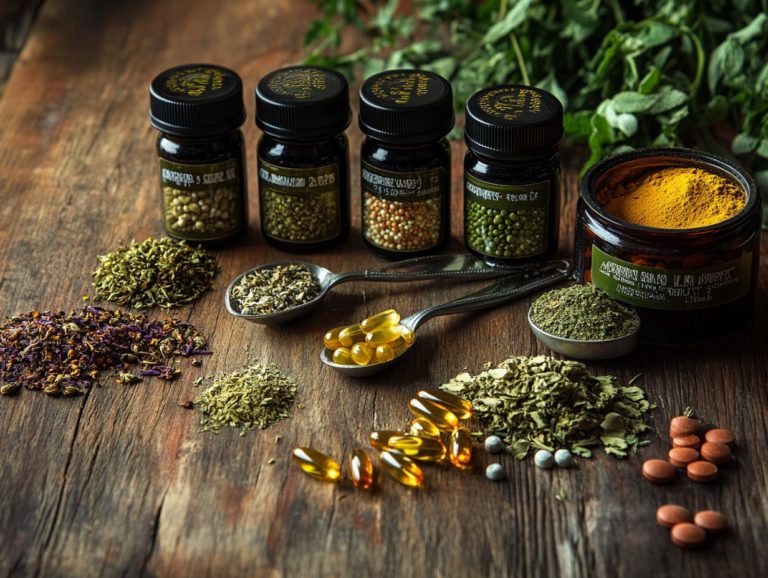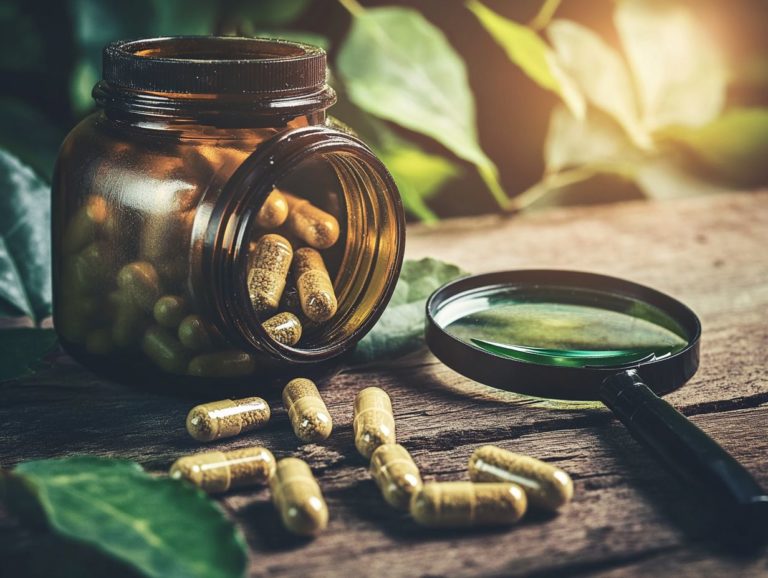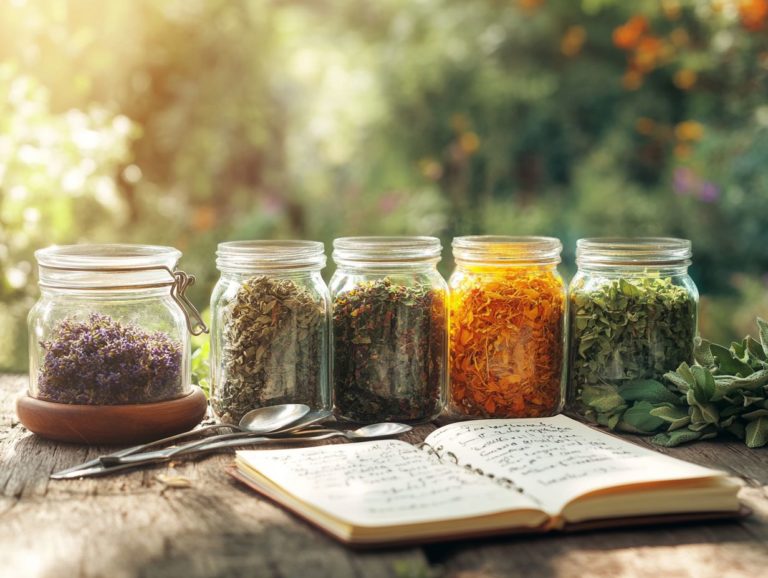Herbal Safety: What You Need to Know
Herbal supplements have surged in popularity due to their touted health benefits. Yet, it’s crucial to approach them with caution.
This article delves into what herbal supplements are, the regulations that govern their use, and the potential risks involved such as interactions with medications and the threat of contamination.
You ll discover valuable insights on how to select safe and effective products, the importance of consulting healthcare professionals, and tips for responsible usage.
By grasping these essential factors, you can make informed decisions about integrating herbal supplements into your health routine.
Contents
- Key Takeaways:
- Potential Risks of Herbal Supplements
- How to Choose Safe and Effective Herbal Supplements
- Tips for Safe Usage of Herbal Supplements
- Frequently Asked Questions
- What is herbal safety and why is it important?
- Are all herbal products safe for consumption?
- How can I ensure the safety of the herbal products I purchase?
- What are some common side effects of using herbal remedies?
- Can herbal remedies be harmful if not used correctly?
- Are there any herbal products that are safe for everyone to use?
Key Takeaways:
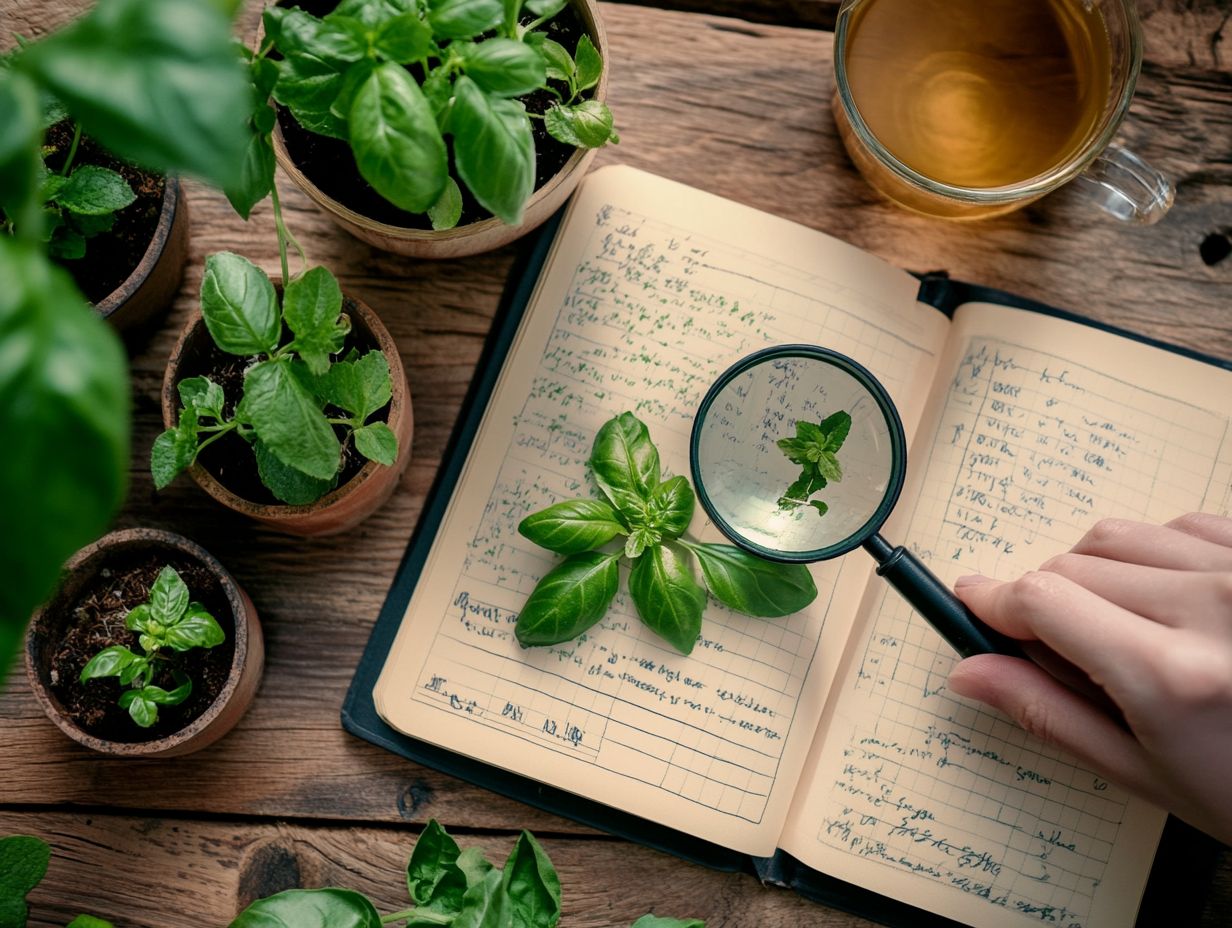
- Research and consult healthcare professionals to ensure the safety and effectiveness of herbal supplements.
- Monitor for potential interactions with medications and be aware of contamination and adulteration risks.
What Are Herbal Supplements?
Herbal supplements are natural products sourced from medicinal plants, offering a range of health benefits. You might turn to Ginkgo for a mental boost or Kava to help alleviate anxiety. Many people also reach for well-known options like St. John s Wort to enhance mood or Ginger to tackle digestive issues.
Understand the potential uses and importance of safety in herbal medicine as well as safety concerns of these supplements. Quality control is also crucial before integrating them into your health regimen.
Historically, herbal remedies have been central to traditional medicine systems around the world, such as Ayurveda and Traditional Chinese Medicine, where they’ve been utilized for centuries to promote overall wellness. Today, these supplements are not only celebrated for their therapeutic potential but also face scrutiny regarding their efficacy and safety in contemporary settings.
You’ll find herbal products in various forms, like teas, capsules, and tinctures, each serving unique purposes that allow you to choose what fits your lifestyle best. While many herbs are considered safe when used correctly, it’s crucial to understand herbal safety for kids and factors such as quality, dosage, and potential interactions with pharmaceutical drugs to ensure safe usage.
Regulations and Standards for Herbal Products
The regulation of herbal products is essential for ensuring your safety and maintaining effective quality control, especially with the growing popularity of supplements in health and wellness markets.
Various regulatory frameworks are in place to oversee these products, concentrating on their safety, efficacy, and how these products are made. Organizations like the American Botanical Council play a crucial role, offering guidance and resources on best practices not just for manufacturers but for you as a consumer as well. For additional insights, consider the 5 essential tips for safe herbal use.
Without stringent quality control measures, you might come across products that are ineffective or, worse yet, potentially harmful. This underscores the risks tied to unregulated offerings. To navigate this intricate landscape, it s wise for you to research reputable brands and look for third-party certifications. This gives you the power to make informed decisions about your health and well-being.
Potential Risks of Herbal Supplements
While you may view herbal supplements as safe alternatives to conventional medicine, it’s essential to recognize that they can carry significant risks. Adverse effects, such as those related to Kava or Ginkgo, and dangerous drug interactions may arise, potentially compromising your health in unexpected ways.
Stay informed and act wisely to protect your health!
Interactions with Medications
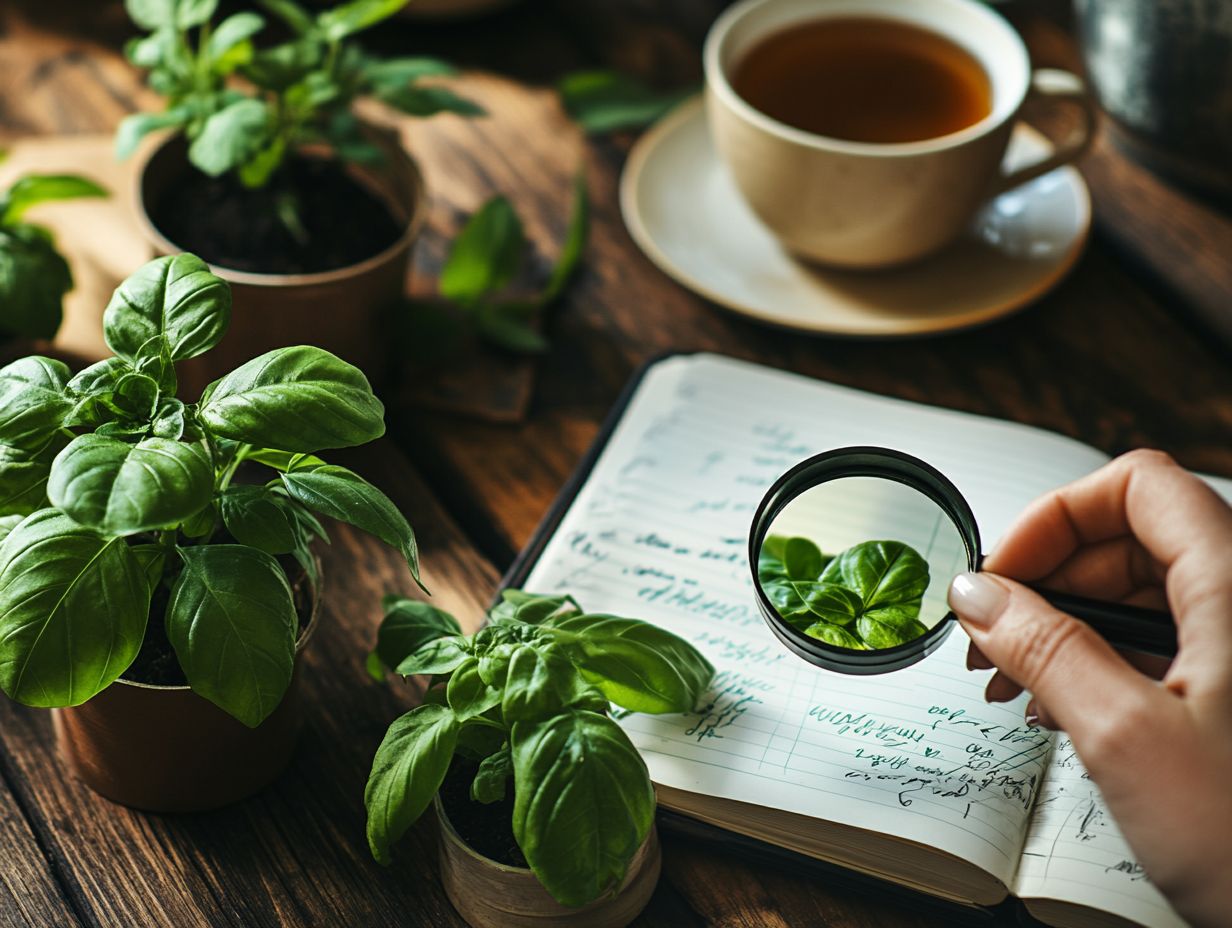
Interactions with medications can pose a significant concern when using herbal supplements. Substances like St. John’s Wort may alter the effectiveness of your prescription drugs.
These herbal products can either amplify or diminish the effects of conventional medications. This can sometimes lead to unwelcome reactions. For example, St. John’s Wort is known to induce liver enzymes the substances that help break down drugs in your body which can lower the levels of certain medications, such as antidepressants or birth control pills, making them less effective.
On the flip side, Ginkgo might enhance the effects of anticoagulants like warfarin. This increases the risk of bleeding and highlights the importance of understanding drug interactions.
Such interactions emphasize the importance of consulting healthcare professionals before combining herbal supplements with prescribed treatments. This way, you can ensure safety and efficacy, empowering you to make informed decisions about your health.
Contamination and Adulteration
Contamination and adulteration are critical safety concerns in the herbal supplement industry. Unregulated products can pose significant health risks to you as a consumer.
These issues emerge when harmful substances like heavy metals, pesticides, or even fillers make their way into products. This often occurs due to poor manufacturing practices or sourcing from unreliable suppliers.
Common sources of contamination include polluted growing environments, improper storage, and a lack of quality checks during processing.
Adulteration occurs when lower-quality ingredients are intentionally added to boost profits or mimic the effects of genuine herbs, ultimately misleading you.
It’s crucial for you to prioritize quality control measures, such as third-party testing. Seek out reputable retailers that provide transparent sourcing information! Doing so ensures a safer and more reliable supplement experience.
How to Choose Safe and Effective Herbal Supplements
Selecting safe and effective herbal supplements demands a comprehensive understanding of the available options. Engaging in careful study, paired with the guidance of healthcare professionals, is essential to achieving optimal health outcomes.
Researching and Evaluating Products
Researching and evaluating herbal supplements is essential for you to choose high-quality products that meet rigorous safety and effectiveness standards.
This journey often begins with a detailed examination of clinical studies related to the specific herbal ingredient you re considering. These studies provide valuable insights into its efficacy and potential side effects.
Next, it s wise to seek out product reviews that reflect the experiences of other users. This offers you a practical perspective on the supplement s performance.
Certifications from reputable organizations can serve as crucial indicators of quality. They signal that the product adheres to strict standards for purity and potency.
Understanding the role of quality control in the manufacturing process empowers you to make informed choices. Higher-quality brands typically implement rigorous testing to ensure that their supplements are both safe and reliable.
Consulting with Healthcare Professionals
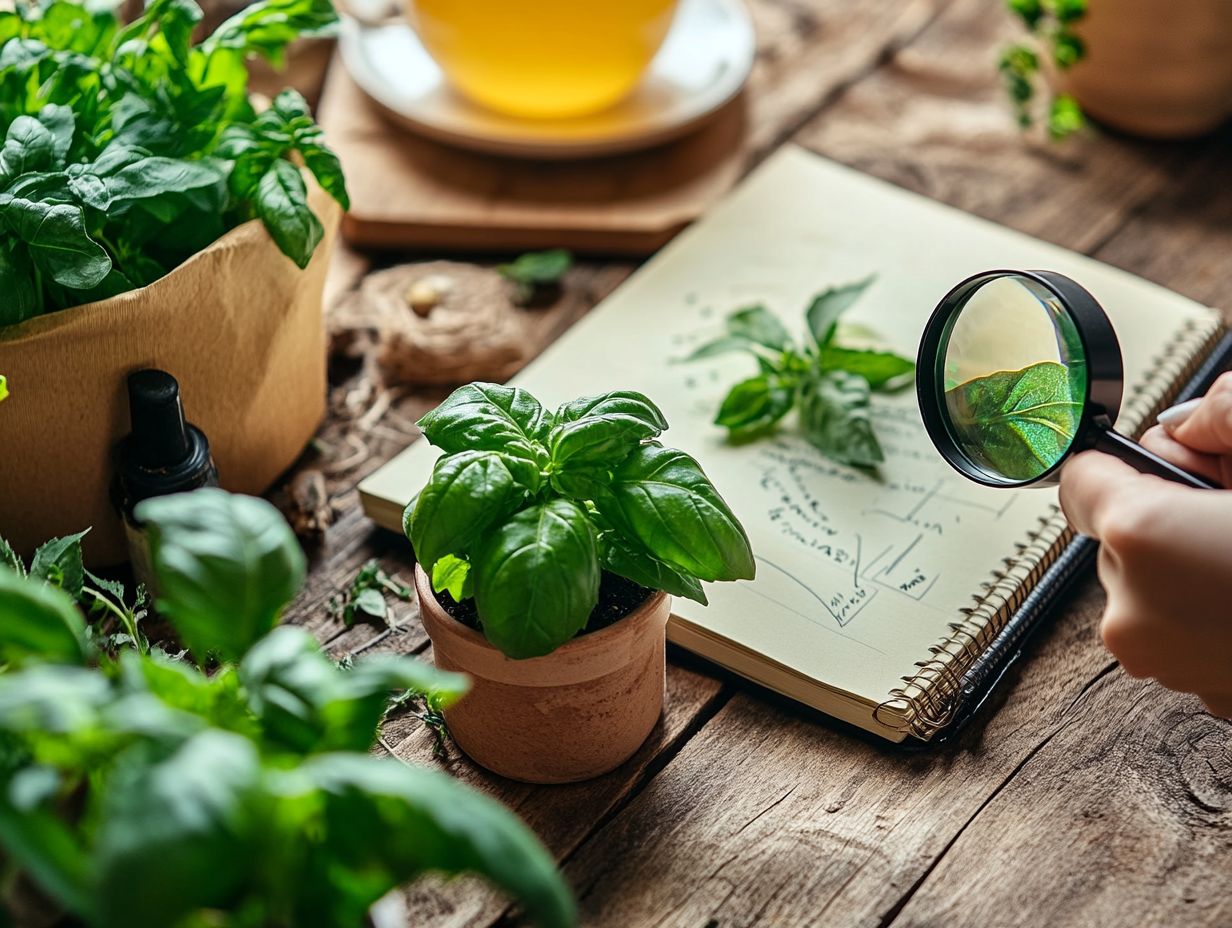
Consulting healthcare professionals before you embark on the journey of taking herbal supplements is a crucial step in safeguarding yourself against potential safety issues. This is especially important with popular options like Ginkgo and Kava, as well as harmful drug interactions.
These experts offer invaluable insights into the effectiveness and safety of various herbal options, empowering you to make informed choices tailored specifically to your unique health needs.
By thoroughly evaluating your medical history and current medications, healthcare providers can pinpoint which herbal products might harmonize with your health regimen while minimizing risks.
They can also guide you in understanding dosages, potential side effects, and interactions with any ongoing treatments. This collaborative approach ensures that you are equipped with the essential information needed to achieve the desired health benefits while prioritizing your overall well-being.
Key Takeaways
- Consult healthcare professionals before taking herbal supplements.
- Research clinical studies and product reviews to ensure quality.
- Be aware of potential drug interactions with prescribed medications.
- Look for third-party testing and certifications for safety.
- Prioritize quality control measures in your supplement choices.
Take charge of your health today!
Tips for Safe Usage of Herbal Supplements
To ensure your safe use of herbal supplements, it s essential to adhere to proper dosage guidelines and remain vigilant for any negative side effects. This careful approach will help you maximize benefits while minimizing risks.
Proper Dosage and Administration
Understanding the proper dosage and administration of herbal supplements is crucial. This knowledge allows you to maximize their benefits while minimizing safety concerns and potential adverse effects.
Herbal supplements, often viewed as gentle alternatives to prescription medicine, can actually have significant impacts. That’s why it’s vital to stick to the recommended dosages. This is especially important for potent herbs like Licorice Root or Black Cohosh, which can differ based on various factors such as age, weight, health status, and the specific conditions you’re addressing. For safe practices, refer to creating herbal remedies: safety tips.
The method you choose for taking these supplements whether as teas, capsules, tinctures, or extracts can greatly affect their effectiveness and how well your body absorbs them. For example, some forms may provide quick relief, while others may deliver gradual, long-lasting benefits.
Consulting with healthcare professionals is very important. They can help you create a personalized supplementation plan that meets your individual needs, ensuring safe and effective use.
Monitoring for Side Effects
Active monitoring for side effects is essential when you re using herbal supplements. Many products can yield unexpected reactions that could impact your overall health.
While herbal supplements are often viewed as natural and safe, they can interact with other medicines or trigger allergies and other adverse effects. For example, a popular supplement like St. John’s Wort can increase your sensitivity to sunlight, cause digestive issues, or even lead to fatigue. Additionally, incorporating herbal tea for heart health can be beneficial, but it’s important to be aware of potential interactions as well.
Similarly, taking ginkgo biloba might result in headaches or gastrointestinal disturbances. It s wise to maintain a journal of any symptoms you experience, noting their timing and intensity, and sharing these observations with your healthcare provider.
This proactive approach not only helps you manage side effects more effectively but also supports informed decisions about your continued use of these supplements.
Frequently Asked Questions
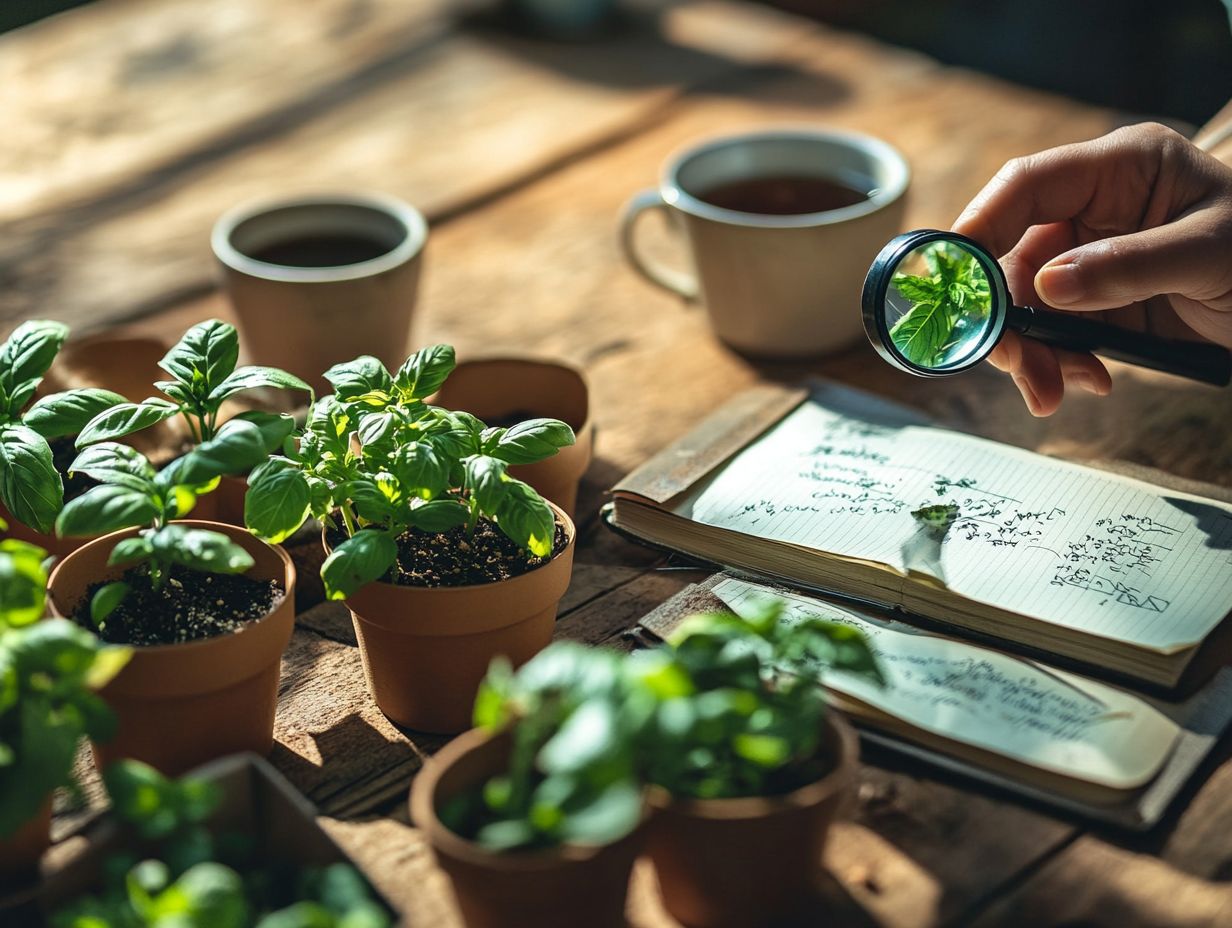
Have questions about herbal safety? Let’s break down the most common queries!
What is herbal safety and why is it important?
Herbal safety refers to the potential risks and hazards associated with using herbal remedies for medicinal purposes. Understanding these risks is crucial to ensure the safe and effective use of herbal products.
Are all herbal products safe for consumption?
No, not all herbal products are safe for consumption. Some may interact with other medicines or have adverse effects on certain individuals. It is important to thoroughly research and consult with a healthcare professional before using any herbal product.
How can I ensure the safety of the herbal products I purchase?
To ensure the safety of herbal products:
- Purchase from reputable sources.
- Carefully read labels for any warnings or potential side effects.
- Consult with a healthcare professional for further assurance of the product’s safety.
What are some common side effects of using herbal remedies?
Common side effects of using herbal remedies include:
- Stomach upset
- Allergic reactions
- Interactions with other medicines
It is important to monitor your body’s response to any herbal product and discontinue use if you experience any adverse effects.
Can herbal remedies be harmful if not used correctly?
Yes, herbal remedies can be harmful if not used correctly. It is important to follow dosage instructions and consult with a healthcare professional before using any herbal product, especially if you have underlying health conditions or are taking other medicines.
Are there any herbal products that are safe for everyone to use?
While some herbal products may be generally safe for most individuals, it is still important to consult with a healthcare professional before use. Every person’s body and health are unique, so what may be safe for one person may not be safe for another.


